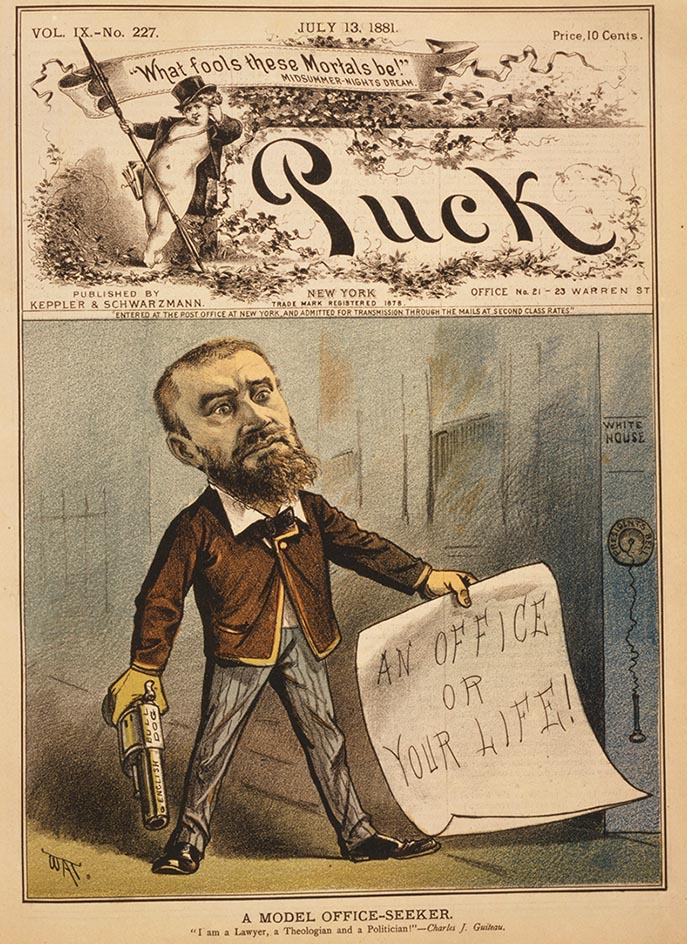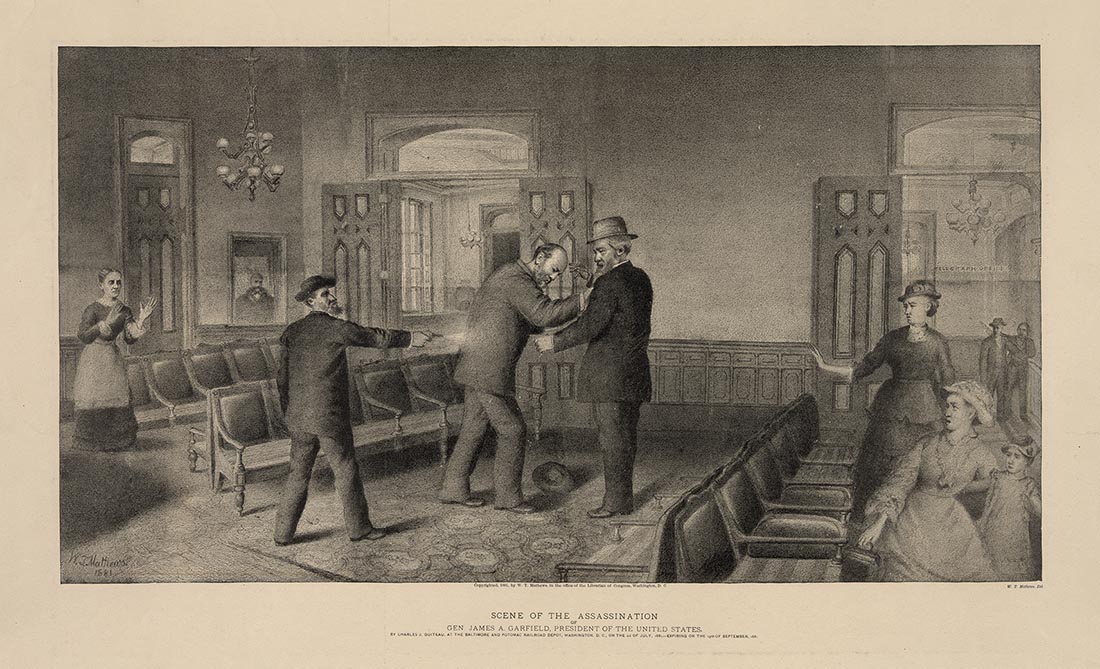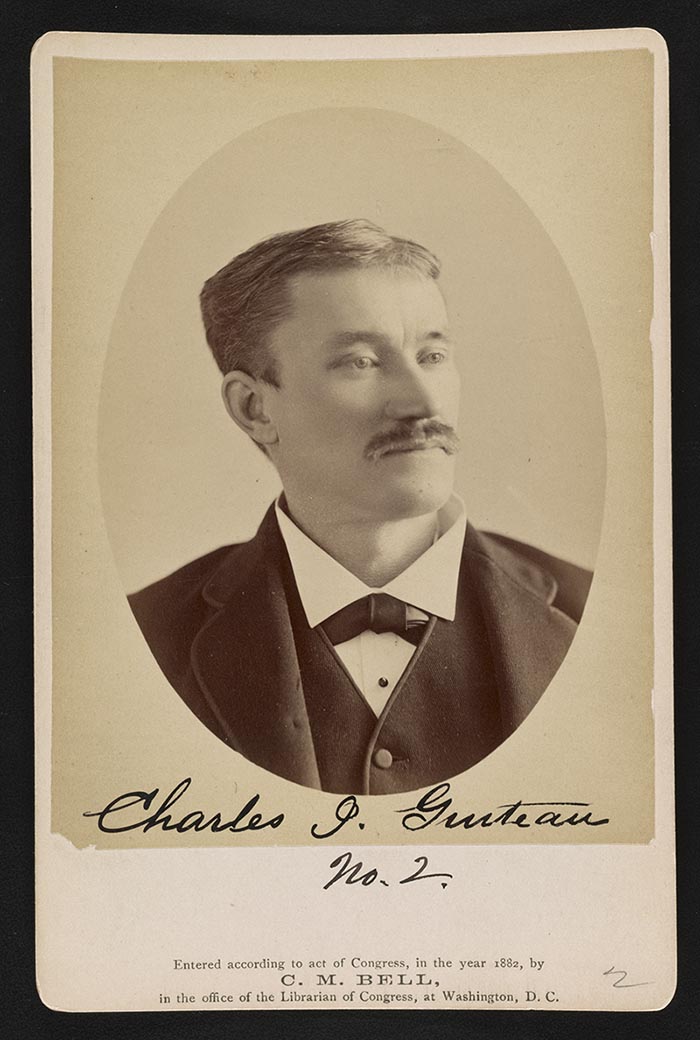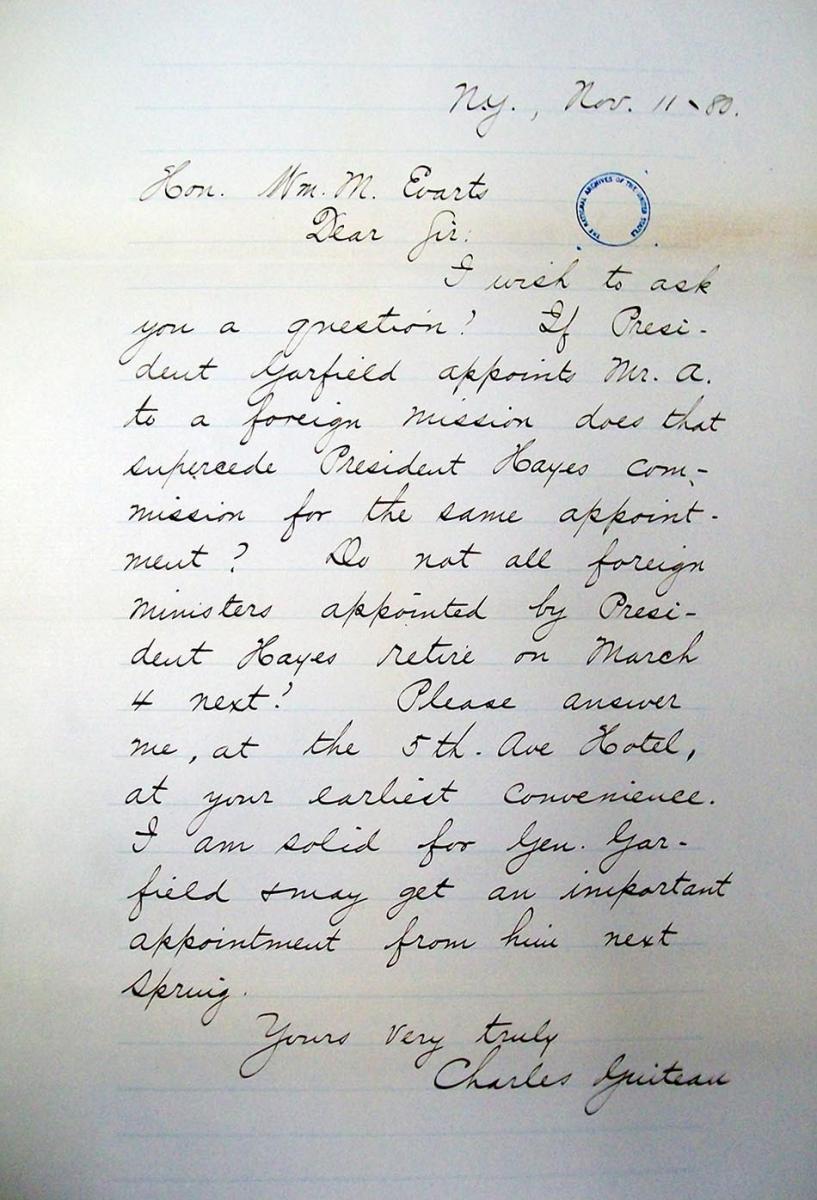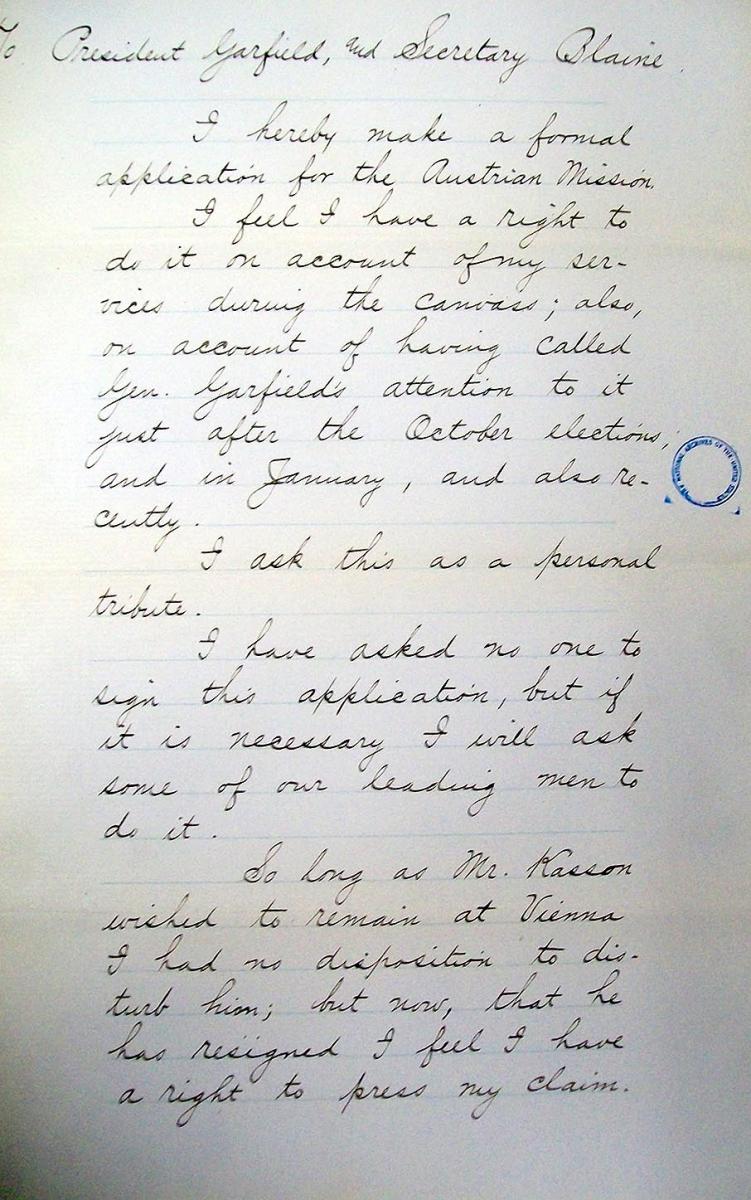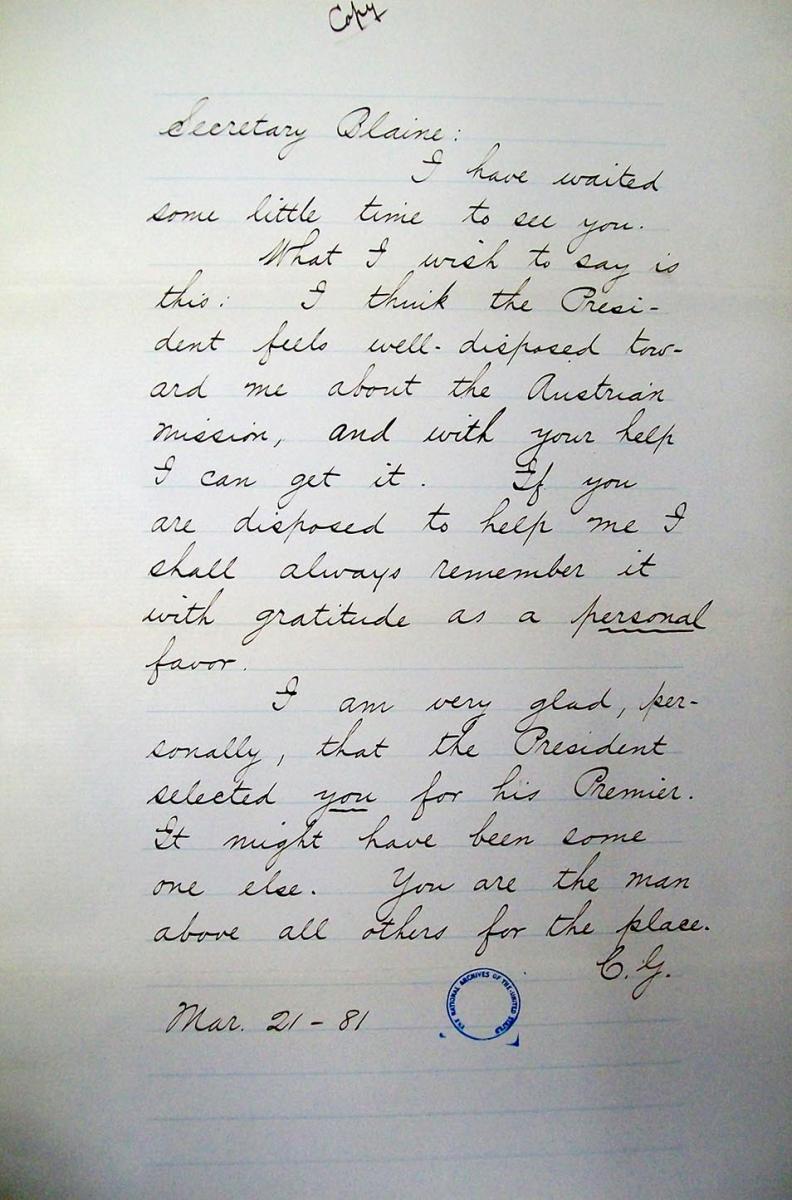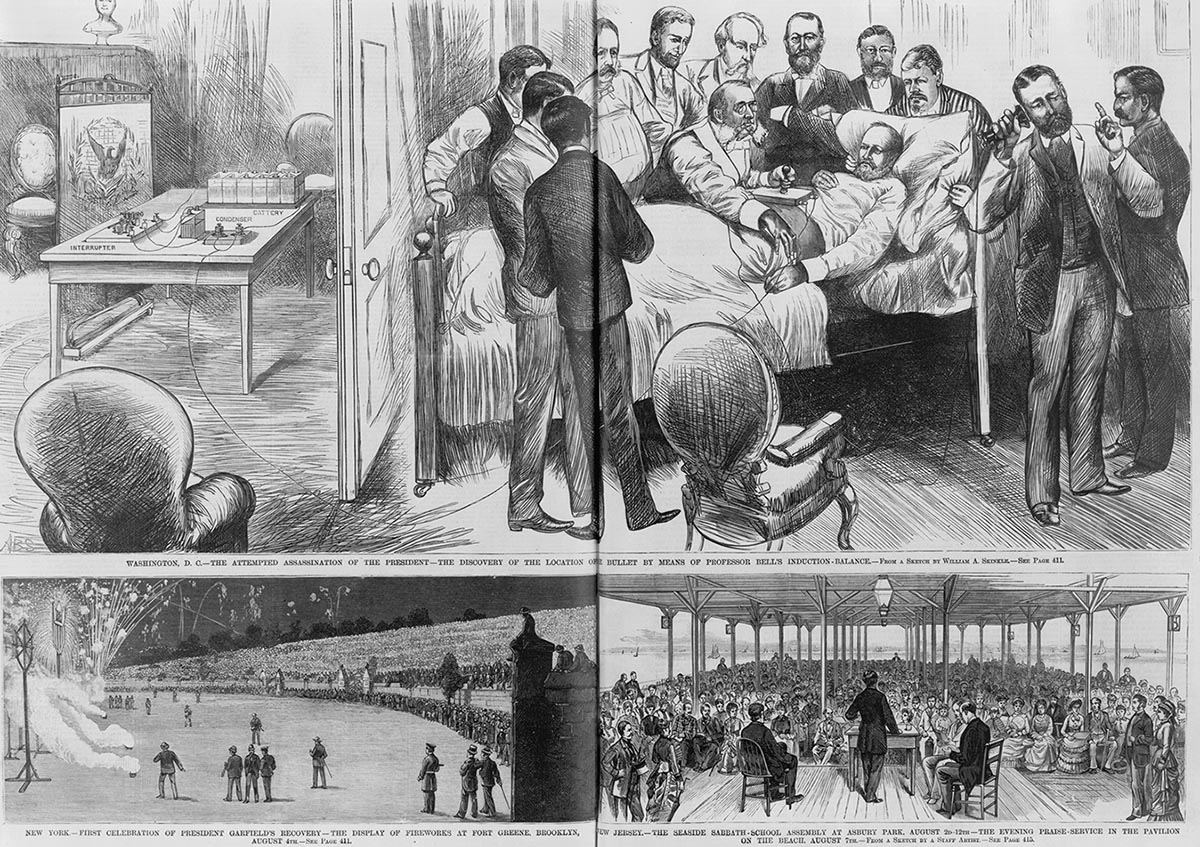
A Stalwart of Stalwarts
Garfield’s Assassin Sees Deed as a Special Duty
Fall 2016, Vol. 48, No. 3
By Jay Bellamy
“I am a Stalwart of Stalwarts,” the crazed little man told the authorities as he was being arrested for shooting the President of the United States. “Arthur is President now!”
On the morning of July 2, 1881, Charles Guiteau—a failed evangelist, insurance salesman, and attorney—shot President James A. Garfield as he entered the Baltimore and Potomac Railway station in Washington, D.C.
Just four months into his presidency, Garfield was about to travel to Williams College in Massachusetts to attend his 25-year class reunion. Traveling with the President were his teen-aged sons, James and Harry. Upon entering the station, Guiteau approached Garfield from behind and fired two point-blank shots at the President.
Upon hearing the first shot, which grazed his shoulder, Garfield cried out “My God, what is this?” before being struck by a second shot, which lodged just behind his pancreas.
After being moved to a private area in the train station, Garfield said to a doctor, “I thank you, doctor, but I am a dead man.” The President, however, would live for another 11 weeks before succumbing to his wounds on September 19, 1881.
Seeing the President off that morning were Secretary of State James G. Blaine and Secretary of War Robert Todd Lincoln, the son of the martyred 16th President.
In a cruel twist of fate, Robert Lincoln would be in the proximity of three presidential assassinations during his lifetime. He was at the White House when his father was shot in 1865; he was at the station with Garfield; and he was with President William McKinley in Buffalo, New York, when an assassin struck again in 1901.
As Garfield lay on the ground bleeding, Guiteau headed toward the exit on Sixth Street. Hearing screams of “There he is!” he exited the station and was immediately apprehended by a local police officer who quickly reacted when he heard the crowd call out, “Stop him. He shot the President!”
Warring Factions in the 1880 Election
So who was Charles Guiteau, and what would lead him to assassinate the President of the United States, a President who seemingly had very little time in office to upset anyone to that degree?
His claim that he was a Stalwart and that Vice President Chester Arthur would now be President led some to believe that the New York Republican Party machine, headed by Senator Roscoe Conkling, might have been behind the assassination and that Guiteau was simply a means to carry out the deed.
The Stalwarts of the Republican Party were loyal supporters of former President Ulysses S. Grant, who lost the nomination in 1880. Although initially disappointed by Grant’s defeat, Guiteau immediately set out to ensure Garfield’s victory.
So what set Guiteau so violently against Garfield?
Did He Inherit His Mother’s Illness?
Born on September 8, 1841, in Freeport, Illinois, Charles Guiteau was raised by his father, Luther Guiteau, after his mother’s untimely demise in 1848. Jane Guiteau had suffered from psychosis for much of her life—a mental condition involving a “loss of contact with reality and difficulty with social interaction”—and as Charles grew older, it appeared that he might have inherited some of his mother’s illness.
Although he always tried to please his father, Charles was somewhat awkward and would often stammer, leading to painful beatings when he was unable to pronounce a word correctly or without a stutter. In addition, Luther would physically punish his son over what he perceived to be his religious shortcomings.
Guiteau spent his early years working for his father, who held various positions in both the private and government sectors, before leaving for the University of Michigan in Ann Arbor, where he quickly became disenchanted with college life. Never good at making friends—due in part to an inflated sense of self-importance—he left the university in 1860 and soon afterwards joined the Oneida Community, a religious commune located in Oneida, New York.
The Oneida Community was founded in 1848 by John Humphrey Noyes, a radical preacher who believed it was possible to achieve spiritual perfection through constant prayer and education. Also practiced at Oneida was what Noyes referred to as “complex marriage,” which was simply another term for what we would refer to today as “free love.”
However, as enthusiastic as Guiteau was about the prospect of practicing “complex marriage,” he found his options limited since many of the young women were not interested in him as a partner.
Guiteau Not a Willing Worker at Oneida
Adding to Guiteau’s frustration was the idea that everyone was expected to help out with the most menial of tasks at the commune. Guiteau sent Noyes a note explaining that he was sent by God to help him and therefore should not be expected to do any work that he personally found objectionable. During many of the group criticism sessions, Guiteau was repeatedly called an egotist and accused of being conceited. Feeling disrespected and insulted, Guiteau left the commune in April of 1865.
Three months later, after failing in his attempt to start his own newspaper, Guiteau asked to rejoin Oneida. Not long after his return, he started complaining about the inability of others to see his true genius.
A year later, he left Oneida for good, sneaking out in the middle of the night. He most likely could have walked out in broad daylight without anyone attempting to stop him.
By 1868, after living on an inheritance and working for a short time selling newspaper subscriptions, Guiteau decided to practice law. He returned to Illinois to begin his new career, where he served several months as a law clerk before taking the bar exam. The exam itself consisted of just three questions, two of which he answered correctly. Probably to everyone’s surprise but his own, Charles Guiteau was now a licensed attorney.
Guiteau Tries Evangelism but Fails
With bill-collecting his primary source of income, Guiteau would often pocket whatever money he was able to collect. When he did appear before a jury, he would spend more time arguing about religion and theology than he did in presenting his case.
In 1869 he married Anne Bunn, a librarian at the local YMCA, and this union was destined to fail. He was physically and verbally abusive, and he would often lock her in a closet for hours at a time whenever she would question his actions. After five years, she divorced him after discovering he had visited a prostitute.
Guiteau was living with his sister and her husband in Wisconsin after his divorce when a terrifying incident took place in 1875 that forced Frances Guiteau to question the sanity of her brother.
As she bent down one day to pick up some firewood that Charles had angrily dropped on the walkway, he slowly raised an ax above her head. When she turned and saw the look of a “wild animal” in his eyes, she dropped the wood and ran into the house. After conferring with her family doctor, Frances considered taking him to Chicago to face a jury that was sure to find him insane. However, Guiteau was not about to face a lifetime in an asylum, so he sneaked out of his sister’s home.
Deciding that theology was now his true calling, sometime around 1877 Guiteau began preaching the religious doctrine taught to him by Noyes. He traveled from town to town, rarely paying his rooming bills, claiming that he was doing the Lord’s work and therefore should not be expected to pay.
His attempts at evangelizing, however, were no more successful than his work as an attorney. The few people who would show up to hear him speak would often leave before he was finished. Guiteau himself later admitted that he had been a failure as an evangelist.
Next, Guiteau attempted to start a new career as an insurance salesman in Boston but failed there as well.
Surviving a Shipwreck: A Sign from God?
What he did discover while living in Boston was a keen interest in politics. Having decided that the Republican Party and the Stalwarts most closely represented his own ideals, Guiteau now focused on obtaining a political appointment for himself, although he had no qualifications.
Guiteau wrote a pamphlet outlining Grant’s virtues titled Grant against Hancock and then set out for New York to offer his services to the National Republican Committee. On July 11, 1880, the steamer Stonington departed Boston for New York.
As she sat moored in a heavy blanket of fog near the Connecticut shoreline, the steamer Narragansett struck her head on, killing 80 people onboard both ships. Guiteau, who was standing on the deck of the Stonington and was uninjured, saw this as a sign that he was spared to accomplish great things in life, particularly in the political arena.
When Garfield was selected on the 36th ballot as the “alternative” candidate, Guiteau immediately set out to obtain a political appointment in a Garfield administration. He showed up at “The Fifth Avenue Summit,” where national leaders were meeting to discuss the Republican role in the postwar South and settle patronage issues.
Guiteau distributed his pamphlet, now changed to Garfield against Hancock, to anyone who would accept it and basically made a nuisance of himself. In an attempt to quiet him, party leaders allowed him to deliver his speech with Garfield standing at his side. When rumors circulated that a patronage deal had been struck, Guiteau now felt assured that there would be a job for him in a Garfield administration!
After Garfield’s election in 1880, Guiteau wrote to the presiding secretary of state, William M. Evarts, asking if it was required for all foreign ministers under President Rutherford B. Hayes to retire when the new administration took office the following March. He added that it was quite possible he could be appointed to a very important position once President-elect Garfield entered the White House.
Guiteau Pushes Blaine for Paris Job
Guiteau wrote to both President Garfield and Secretary Blaine, claiming a right to the position of consul to Austria “on account of my service during the canvas.” He then added that he felt he should be awarded this post as a “personal tribute” for his efforts.
Shortly thereafter, however, he decided that Paris would be a better fit for him. After moving into a Washington boardinghouse on March 10, 1881, Guiteau showed up at the White House asking to see the President.
As he entered the executive office, he handed the President a copy of his Garfield against Hancock pamphlet, with his name and the words “Paris consulship” written on the front. After declaring that he was an applicant for the position, he took a seat while the President quietly read the document. Several minutes later, Guiteau inexplicably rose from his chair and departed without speaking another word.
The next day he wrote to Blaine, claiming that he had spoken to Garfield and the President had said, “An endorsement would help as it was in your department.” He also claimed the right to the Paris consulship based on what he thought was the strength of his “Garfield against Hancock” speech in New York.
He informed Blaine that he had sent copies of the speech to “our leading editors and orators” in August of the preceding year, and he boasted that it was because of the ideas presented in this speech that Garfield was elected President.
Several days later, Blaine received a letter from Guiteau in which he wrote that Colonel Hooker of the Republican National Committee had led him to believe he would be granted a consul position and he hoped it would be in Paris. Guiteau further stated that he had previously left some papers with the secretary’s son Walker Blaine regarding the Austrian mission, but he now pursued the Paris station since the post at Vienna was already taken.
Guiteau again wrote Blaine on March 21, saying that he believed Garfield was “well disposed toward me about the Austrian mission, and with your help I can get it.” He then expressed his belief that the President had made the right choice in selecting Blaine as his secretary of state and that he was “the man above all others for the place.” It is uncertain why he once again mentions the Austrian mission. Did he mean to write Paris, or was he just covering all his bets?
Guiteau then began pressing his case to anyone he felt might be of help to him. He even showed up at a White House reception and introduced himself to Lucretia Garfield, the President’s wife, telling her that he was “one of the men that made Mr. Garfield President.”
He also approached Indiana senator Benjamin Harrison—who would later become the 23rd President—and asked if he could intervene on his behalf. Harrison politely told Guiteau that there were many from his own state seeking jobs and that his first loyalty was to his own constituents.
Blaine Rejects Guiteau for Paris Posting
At the end of March, Guiteau made a personal visit to Blaine at the State Department, where he handed the secretary a copy of his pamphlet and again made known his interest in the Paris consulate. When Blaine gave no commitment either way, Guiteau became a regular visitor to his office. Blaine would politely inform him that the issue of consulates had not been taken up yet.
On May 14, Secretary Blaine had had enough. “Never speak to me again on the subject of the Paris consulate,” he snapped when Guiteau asked if there was anything new to report. Guiteau responded angrily, “I am going to see the President about this.”
Guiteau hurried back to his boardinghouse and quickly dashed off a letter to the President telling him of Blaine’s behavior. He wrote that he had previously considered Blaine a friend and was therefore confused. Nine days later he wrote to Garfield again with a demand that Blaine be dismissed, or “otherwise you and the Republican Party will come to grief.” He then informed the President that he would be stopping by the following day. The President’s private secretary, however, had already issued orders to White House ushers to see to it “that Mr. Guiteau no longer troubled the office.”
Still stinging from Blaine’s rebuff and discovering that his access to the President had been cut off, Guiteau realized that his dream of a political appointment had vanished. For the next few weeks he prayed for divine guidance.
Believing that his request had been denied simply because he was a Stalwart, Guiteau felt that it was necessary to kill the President in order to restore peace between the various factions in the Republican Party.
Certain that it was God’s will for him to kill the President, Guiteau attempted to publish a religious manuscript. In actuality, The Truth: A Companion to the Bible was nothing more than a plagiarized version of a book written by the Oneida leader Noyes.
He ordered a thousand copies printed with the name of a well-known publisher and then attempted to sell them on the streets of Boston. Unsuccessful at that, he returned to Washington, bought a gun, and then waited for the opportunity to save the Republican Party and to gain the notoriety he always felt he deserved.
Guiteau Found Guilty and Is Hanged
When the imprisoned Guiteau learned that Garfield had died, he wrote to President Arthur expressing his hope that the President appreciated what he had done for him.
He even sent a note to Gen. William T. Sherman, asking that his troops take immediate possession of the jail in order to secure his release, explaining that assassinating the President had merely been a “political necessity.” Sherman responded: “I don’t know the writer. Never heard of him or saw him to my knowledge.”
On October 14, 1881, Charles Guiteau was formally indicted for the murder of President James A. Garfield. The trial began exactly one month later. Dr. Edward Charles Spitzka, testifying for the defense, declared that Guiteau was insane and always had been. In response, the prosecutor, George Corkhill, claimed that Guiteau was nothing more than a deadbeat who was looking for attention and had found it by killing the President.
Throughout the trial, Guiteau exhibited behavior so bizarre that it only gave credence to the defense team’s contention that their client was insane. He cursed and insulted everyone in the courtroom, including his own attorney (who happened to be his sister’s husband, George Scoville) and the judge himself. At times he even passed notes to spectators in the courtroom, asking for their advice on how to proceed.
Guiteau claimed several times that: “The doctors killed Garfield, I just shot him,” and history seems to have proven him correct. It is now believed that it was not the bullet that killed the President but the use of unsterilized instruments and the practice of doctors probing his wound with dirty hands.
Convinced that either Arthur would pardon him or the jury would find him not guilty, Guiteau began making plans for a lecture tour and a run for President in 1884. He even advertised for a wife in the New York Herald, asking for a wealthy Christian woman under 30 years of age.
When he was found guilty on January 25, 1882, he lambasted the jury by calling them “low, consummate jackasses” and promised that “God will avenge this outrage!” He then proclaimed to the judge, “I am not guilty of the charge set forth in the indictment. It was God’s act and not mine, and God will take care of it.”
After his one and only appeal was denied, Guiteau was hanged on June 30, 1882, just two days before the first anniversary of the assassination.
Jay Bellamy is an archives specialist in the Research Support Branch at the National Archives at College Park, Maryland, and a frequent contributor to Prologue.
Note on Sources
Guiteau’s letters to Garfield, Blaine, and Evarts can be found in “Letters of Application and Recommendation—Hayes, Garfield and Arthur, 1877–1885,”General Records of the Department of State, Record Group 59, National Archives, College Park, MD.
Two useful secondary sources are Dark Horse. The Surprise Election and Political Murder of President James A. Garfield by Kenneth D. Ackerman (New York: Carroll and Graff Publishers, 2003) and Destiny of the Republic. A Tale of Madness, Medicine and the Murder of a President, by Candice Millard (New York: Anchor Books, 2011).
Learn More About . . .
- The murder of President Garfield
- Alexander Graham Bell’s attempt to help President Garfield
- Robert Todd Lincoln’s connection to three presidential deaths
